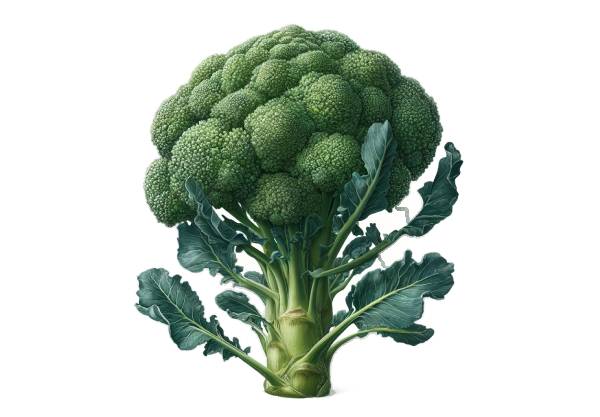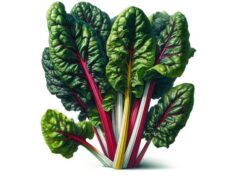
Introduction to Broccoli
Broccoli, a cruciferous vegetable from the Brassicaceae family, originated in the Mediterranean region and has been cultivated for more than 2,000 years. This versatile vegetable is known for its high nutritional value and numerous health benefits. Broccoli, scientifically known as Brassica oleracea var. italica, has long been a staple in various cuisines around the world, valued not only for its distinct flavor but also for its potential to improve overall health.
Broccoli’s role in maintaining overall health is well documented. It is frequently referred to as a “superfood” because of its high concentration of vitamins, minerals, and antioxidants. Broccoli consumption on a regular basis is associated with a lower risk of chronic diseases such as heart disease, cancer, and diabetes. Furthermore, broccoli is high in dietary fiber, which promotes digestive health, and it contains bioactive compounds with anti-inflammatory and immune-boosting properties. These characteristics make broccoli an important addition to a healthy diet, benefiting both physical health and disease prevention.
Nutritional Content of Broccoli
Broccoli has an impressive nutritional profile, including essential vitamins, minerals, and bioactive compounds that promote eye health and overall well-being. One cup (roughly 91 grams) of raw broccoli contains:
- 31 calories
- 2.6g protein
- 0.3g fat
- 6g carbs
- 2.4g fiber
Key Nutrients in Broccoli for Eye Health:
- Vitamin C: Broccoli is exceptionally high in vitamin C, with approximately 81 milligrams per cup, which exceeds the daily recommended intake for most adults. Vitamin C is a powerful antioxidant that protects the eyes from free radical-induced oxidative stress. This vitamin also promotes the health of blood vessels in the eyes, potentially lowering the risk of cataracts.
- Vitamin A: This vitamin is essential for maintaining clear vision. Broccoli contains beta-carotene, which the body converts to vitamin A. Vitamin A is required for the production of rhodopsin, a pigment in the retina that helps the eyes adapt to low light conditions.
- Lutein and zeaxanthin: These carotenoids are abundant in the retina. Broccoli contains lutein and zeaxanthin, which help filter harmful blue light and protect the eyes from age-related macular degeneration (AMD).
- Vitamin K: A cup of broccoli contains approximately 92 micrograms of vitamin K, which is essential for bone health and proper blood clotting. According to new research, vitamin K helps retinal cells stay healthy.
- B Vitamins: Broccoli contains several B vitamins, such as B6, B9 (folate), and B12. These vitamins help the nervous system function properly and may lower the risk of developing certain age-related eye conditions.
- Minerals: Broccoli contains several essential minerals, including potassium, magnesium, and zinc. These minerals are essential for maintaining proper eye function and preventing diseases such as glaucoma and AMD.
How Broccoli Helps Your Eyes
Broccoli’s high nutritional value makes it an excellent food for improving eye health. Broccoli contains specific nutrients that help with various aspects of eye function and protect against several common eye disorders. Here’s a detailed look at how broccoli helps your eyes:
Protection From Oxidative Stress
When the body’s free radicals and antioxidants are out of balance, oxidative stress develops. The eyes are especially vulnerable to oxidative damage due to their high exposure to light and oxygen. Broccoli contains antioxidants such as vitamin C, beta-carotene, lutein, and zeaxanthin. These antioxidants neutralize free radicals and reduce oxidative stress, shielding the eyes from damage. According to studies, eating an antioxidant-rich diet can reduce the risk of developing cataracts and age-related macular degeneration (AMD).
Prevention of Cataract
Cataracts are a common eye condition in which the eye’s lens becomes cloudy, resulting in impaired vision. Broccoli contains a lot of vitamin C, which helps to prevent cataracts. This vitamin protects the lens from oxidative damage, thereby maintaining its transparency. According to research, consuming more vitamin C in your diet reduces your risk of developing cataracts. In addition, vitamin C’s anti-inflammatory properties help to reduce inflammation, which can contribute to cataract development.
Reducing the risk of age-related macular degeneration (AMD)
AMD is a leading cause of vision loss in older adults, affecting the macula, the area of the retina responsible for central vision. Two carotenoids found in broccoli, lutein and zeaxanthin, are essential for protecting the macula from damage. These compounds absorb blue light, which is harmful to the retina, thus lowering the risk of AMD. According to studies, higher dietary intake of lutein and zeaxanthin is associated with a lower risk of AMD progression. Furthermore, the anti-inflammatory properties of these carotenoids help to maintain retinal health.
Enhancing Night Vision
Vitamin A, which comes from beta-carotene in broccoli, is necessary for good night vision. This vitamin is an essential component of rhodopsin, a pigment in the retina that allows the eyes to detect light in low-light conditions. A deficiency in vitamin A can cause night blindness and other vision problems. Consuming broccoli ensures an adequate supply of beta-carotene, which aids in the production of rhodopsin and enhances night vision.
Supporting Retinal Health
Broccoli contains vitamin K, which supports retinal health. While vitamin K’s primary function is blood clotting and bone health, it also benefits retinal cells. New research suggests that vitamin K may help prevent retinal degeneration, but more research is needed to fully understand its role in eye health.
Lowering the Risk of Glaucoma
Glaucoma is a group of eye conditions that cause damage to the optic nerve, usually as a result of increased eye pressure. Broccoli contains potassium and magnesium, minerals that are important for maintaining normal intraocular pressure. Adequate intake of these minerals helps prevent pressure buildup in the eye, lowering the risk of glaucoma. Furthermore, vitamin C’s antioxidant properties, as well as the anti-inflammatory effects of other broccoli compounds, may help protect the optic nerve from damage.
Improving Overall Eye Function
Broccoli contains B vitamins such as B6, B9 (folate), and B12. These vitamins help with overall eye function. These vitamins help to keep the nervous system healthy, which is necessary for good vision. Folate, in particular, aids in the formation of red blood cells, ensuring that the eyes receive adequate oxygen and nutrients. B vitamin deficiency can cause a variety of eye problems, including blurred vision and an increased risk of infection.
Anti-inflammatory Benefits
Chronic inflammation is a risk factor for many eye diseases, including AMD and diabetic retinopathy. Broccoli contains anti-inflammatory compounds such as sulforaphane, which helps reduce inflammation and protects the eyes from damage. Sulforaphane, a sulfur-containing compound found in cruciferous vegetables such as broccoli, has been shown to possess potent anti-inflammatory and antioxidant properties. Sulforaphane promotes retinal cell health by reducing inflammation and preventing the progression of inflammatory eye conditions.
Improving Immune Health
A strong immune system is essential for defending the eyes against infections and other diseases. Broccoli is high in vitamin C and other immune-boosting nutrients, which helps to strengthen the immune system and protect the eyes from pathogens. Regular broccoli consumption can help reduce the risk of eye infections and improve overall eye health.
Detoxification for Eye Health
Broccoli contains glucosinolates, which are digested to produce active compounds such as sulforaphane. These compounds aid the body’s natural detoxification processes, removing toxins that can harm the eyes. Broccoli promotes detoxification, which helps to keep the eyes healthy and lowers the risk of toxin-related eye diseases.
Tips for Adding Broccoli to Your Diet
To improve eye health, consume 1-2 cups of broccoli per day. This intake provides an adequate supply of essential vitamins, minerals, and antioxidants required to maintain good vision and overall eye health.
Easy and Delicious Broccoli Recipes:
- Broccoli and Cheddar Soup Ingredients: – Fresh broccoli florets – Shredded cheddar cheese – Onions – Garlic – Chicken or vegetable broth – Milk or cream.
- Instruction: Sauté the onions and garlic until softened. Add broccoli and broth, and cook until tender. Blend until smooth, then add the cheese and milk. Season with salt and pepper.
- Roasted Broccoli with Garlic and Parmesan: – Ingredients: broccoli florets, olive oil, minced garlic, grated Parmesan cheese, salt, pepper.
- Instruction: Toss the broccoli with olive oil, garlic, salt, and pepper. Roast at 425°F for 20-25 minutes. Sprinkle with Parmesan cheese before serving.
- Broccoli Stir-Fry ingredients include broccoli florets, soy sauce, sesame oil, ginger, garlic, bell peppers, carrots, tofu, or chicken.
- Instruction: Stir-fry the ginger and garlic in sesame oil, then add the tofu or chicken and vegetables. Pour in the soy sauce and continue to stir fry until the vegetables are tender.
Tips for Choosing, Storing, and Preparing Broccoli
- Selecting: Pick broccoli with firm, bright green florets and stems. Avoid broccoli with yellow florets or wilted leaves.
- Storage: Place unwashed broccoli in a perforated plastic bag in the refrigerator. It is best consumed within a week to maintain freshness.
- Preparing: Rinse broccoli thoroughly with cold water. To ensure even cooking, cut the florets into uniform sizes. Steaming or sautéing broccoli helps to retain more nutrients than boiling.
Trusted Resources
Books
- “Eat to Beat Disease” by Dr. William Li
- “How Not to Die” by Dr. Michael Greger
- “Superfoods: The Healthiest Foods on the Planet” by Tonia Reinhard
Reliable Sources and Studies
- Harvard T.H. Chan School of Public Health
- American Academy of Ophthalmology
- National Institutes of Health
- PubMed Central
- World’s Healthiest Foods
References
- Harvard T.H. Chan School of Public Health: This source provides extensive information on the nutritional benefits of broccoli and other vegetables. Harvard T.H. Chan School of Public Health
- American Academy of Ophthalmology: It offers valuable insights into how diet impacts eye health, particularly the role of antioxidants. American Academy of Ophthalmology
- National Institutes of Health: Features numerous studies and articles on the benefits of vitamins and minerals found in broccoli. National Institutes of Health
- PubMed Central: A comprehensive repository of peer-reviewed studies highlighting the health benefits of broccoli and its components. PubMed Central
- World’s Healthiest Foods: This resource details the nutritional profile of broccoli and provides dietary guidelines. World’s Healthiest Foods










